Economy Front Surface Mirrors
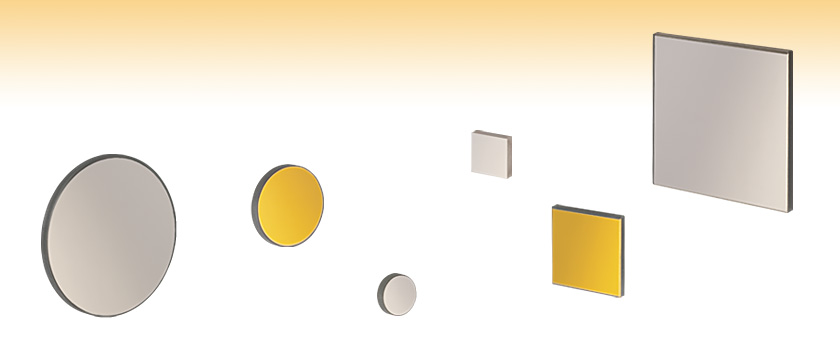
- Economical Solution for Less Demanding Applications
- Protected Aluminum: Ravg > 90% from 450 nm to 2 µm;
Ravg > 95% from 2 to 20 µm - Protected Silver: Ravg > 96.5% from 450 nm to 2 µm;
Ravg > 96% from 2 to 20 µm - Protected Gold: Ravg > 96% from 800 nm to 20 µm
ME2-G01
(Ø2")
ME1-M01
(Ø1")
ME05S-G01
(1/2" x 1/2")
ME05-P01
(Ø1/2")
ME1S-M01
(1" x1")
ME2S-P01
(2" x 2")

Please Wait
| Metal-Coated Plano Mirrors Selection Guide | ||||
|---|---|---|---|---|
Wavelength Range |
Avg. Reflectance
|
Coating |
Suffix |
Coating Comparison |
| 250 nm - 450 nm | >90% | UV Enhanced Aluminum | -F01 | Raw Data |
| 450 nm - 20 μm | >90% for 450 nm - 2 µm >95% for 2 - 20 µm |
Protected Aluminum | -G01 | |
| 750 nm - 1 µm | Rs > 99.0% RP > 98.5% |
Ultrafast-Enhanced Silver | -AG | Raw Data |
| 450 nm - 20 μm | >96.5% for 450 nm - 2 µm >96% for 2 - 20 µm |
Protected Silver | -P01 | |
| >97% for 450 nm - 2 µm >95% for 2 - 20 µm |
Protected Silvera | -P02 | ||
| 800 nm - 20 μm | >96% | Protected Gold | -M01 | Raw Data |
| 2 µm - 20 µm | >98% | MIR Enhanced Gold | -M02 | |
| 800 nm - 20 μm | >97% | Unprotected Gold | -M03 | |
| 10.6 µm Laser Line | >99% | Unprotected Gold | -L01 | |
| Metal-Coated Zerodur® Mirrors | ||||
| Economy Front Surface Mirrors with Protected Metallic Coatings | ||||
Our protected aluminum, silver, and gold coatings exhibit exceptional broadband reflectance and are practical for many applications that are insensitive to the wavefront of a beam. Other typical uses for these mirrors include single-use applications where the experiment itself damages the mirror. A variety of diameters and square sizes are offered, including an 8" x 8" protected aluminum version. Please see the Specs tab for more details on these mirrors.
| Coating | Protected Aluminum (Item #'s Ending in -G01) |
Protected Silver (Item #'s Ending in -P01) |
Protected Gold (Item #'s Ending in -M01) |
|
|---|---|---|---|---|
| Reflectance | Ravg > 90% from 450 nm to 2 µm Ravg > 95% from 2 to 20 µm |
Ravg > 96.5% from 450 to 2 µm Ravg > 96% from 2 to 20 µm |
Ravg >96% from 800 nm to 20 µm | |
| Diameter Tolerance (Round Mirrors) |
+0.0 / -0.20 mm | |||
| Length and Width Tolerance (Square Mirrors) |
+0.0 / -0.20 mm | |||
| Thickness | 3.2 ± 0.20 mm | |||
| Clear Aperture | >90% of Diameter (Round Mirrors) >90% of Length and Width (Square Mirrors) |
|||
| Front Surface Flatness (Peak to Valley) | 5λ @ 632.8 nm | |||
| Surface Quality | 60-40 Scratch-Dig | |||
| Substrate | Float Glass | |||
The shaded regions in the graphs denote the ranges over which we guarantee the specified reflectance. Please note that the reflectance outside of these bands is typical and can vary from lot to lot, especially in out-of-band regions where the reflectance is fluctuating or sloped.
Protected Aluminum Coating (450 nm - 20 µm)
Protected Silver, -P01 Coating (450 nm - 20 µm)
Protected Gold Coating (800 nm - 20 µm)
| Posted Comments: | |
Tatiana Kornienko
(posted 2024-02-29 19:10:02.67) Hello,
Please advise if you have more detailed information on:
1) the graph of the reflectance spectra comparison between a protected silver mirror (like ME2S-P01) and a mid-infrared enhanced mirror (like PFSQ20-03-M02).
2) Can both mirrors be cleaned in the lab?
3) Which of these two mirrors is more robust to scratches?
Thank you so much in advance,
Tatiana ksosnowski
(posted 2024-03-07 12:02:36.0) Hello Tatiana, thanks for reaching out to Thorlabs. The reflectance graphs and raw data for each coating can be found on the respective mirror pages. Both mirrors can be cleaned in lab, with the protected silver mirror it is advised to avoid exposure to water and use other solvents instead, and any loose debris should be removed by air dusting first if possible to avoid scratches during cleaning. There is a link above to our Optics Handling and Care Tutorial for additional detail. Neither of these mirrors are scratch-proof. The silver mirror does have a thin SiO2 overcoat layer however this is meant as protection from oxidation/moisture, not for abrasion. The MIR gold mirror does not have any protective layer since it is not as chemically reactive as silver. I have reached out directly to discuss your application in further detail. Michael Barth
(posted 2023-01-19 09:07:50.8) Ich suche nach einem Planspiegel mit Aluminium-Beschichtung und Aluminium-Substrat. Auch das Modell ME2S-G01 (2" Square Protected Aluminum Mirror, 3.2 mm Thick) wäre eine Option.
Bitte kontaktieren Sie mich per E-Mail.
Danke. cdolbashian
(posted 2023-01-27 04:45:36.0) Thank you for reaching out to us with this request! I have reached out to you directly to discuss this request. 白蛟 白
(posted 2021-04-11 18:31:49.32) The data you supply for the ME05-G01 shows reflectance at 12° and 45°. Is it possible to have data for other angles, for example 20°, 22°, 24°?)
Except that, I prefer to know what device do you used to measure the spectral reflectance at fixed AOI?
Best regards, Jiao Bai. YLohia
(posted 2021-04-14 10:12:32.0) Hello Jiao, thank you for contacting Thorlabs. Data at other AOIs can be requested by contacting your local Thorlabs Tech Support team (in your case, techsupport-cn@thorlabs.com). We will reach out to you directly with more data. S. G.
(posted 2020-03-11 03:55:10.887) What is the substrate parallelism (typical, max value....) for the following mirrors :
ME05-G01
ME1-G01
ME2-G01
Thanks,
S.G. YLohia
(posted 2020-03-11 01:09:05.0) Hello S. G., thank you for contacting Thorlabs. The parallelism of these mirrors is < 3 arc min. David Gherardi
(posted 2019-10-04 10:15:28.877) According to the spec sheet for ME2-M01 the clear aperture is >90% x 50mmØ = >45mm. At 'worst' this corresponds to 81% of the total area.
Ignoring the surface quality specification (as this is for an illumination application) what diameter is actually gold coated?
Thanks. YLohia
(posted 2019-10-04 11:50:36.0) Hello, thank you for contacting Thorlabs. These mirrors are coated out to the edge. That being said, we only guarantee the specs within the clear aperture and we do not recommend using the regions outside. Jiang Bo
(posted 2019-08-12 10:54:15.39) Hi,
I am Jiang from China, I have a question about ME8S-G01. My question is: how to mount this ME8S-G01 mirror on the optical breadboard, I am not found the mirror mount about this module.
Thank you,
Form CNITHCH, CAS, CHINA.
Best,
Jiang B YLohia
(posted 2019-08-14 10:30:01.0) Hello Jiang, thank you for contacting Thorlabs. The following mounts can be used for the ME8S-G01: SFH3, SFH2, LFFM1 with B3C, FP02, and CH2B with additional ER rods. benalunda10
(posted 2018-09-25 20:11:40.23) Helo,
Is ME05-P01 a front surface mirror or not please let me know. Thanks.
Kind Regards, YLohia
(posted 2018-09-27 11:02:44.0) Hello, all mirrors on this page are front surface mirrors. noel.rodrigo
(posted 2017-05-17 15:44:38.353) Can you provide a mirror with a centered millimetric hole? tfrisch
(posted 2017-05-18 08:26:24.0) Hello, thank you for contacting Thorlabs. I will contact you directly about your request for a quote. seminsergv
(posted 2017-03-24 07:13:53.777) What is the minimal possible value for the gold layer thickness? Is it thicker than 300 nm? jlow
(posted 2017-03-29 04:42:39.0) Response from Jeremy at Thorlabs: This is considered proprietary information and we are not able to provide this. chiehming66
(posted 2016-09-13 14:51:22.03) Is there an organic hydrophobic layer on SiO2 coverlayer? If yes, how to remove it? tfrisch
(posted 2016-09-15 04:44:56.0) Hello, thank you for contacting Thorlabs. SiO2 is the top layer. I do not recommend removing coatings from optics in any case, however. canli_scut
(posted 2016-04-19 11:52:21.0) Is ME1-P01 compatible with mirror mount KM100? besembeson
(posted 2016-04-20 08:43:28.0) Response from Bweh at Thorlabs USA: Yes this is compatible. user
(posted 2016-02-19 15:01:04.553) Good day,
Would it be possible to get some of the economy mirrors such as ME05S-G01 in partial reflective coatings to use as an output coupler? besembeson
(posted 2016-03-04 10:10:56.0) Response from Bweh at Thorlabs USA. Possibly. I would need to know the reflection/transmission characteristics for your application to determine this. Please contact me at techsupport@thorlabs.com. user
(posted 2015-11-18 19:05:17.22) Can You provide data of the complex (n and k) refractive index of the silver mirrors, e.g. compared to the surface of a pure bulk silver ? besembeson
(posted 2015-11-19 01:27:34.0) Response from Bweh at Thorlabs USA: This is not information that we provide at this time. mtaormin
(posted 2015-07-20 18:39:46.437) (Technical inquiry) I am curious about intentional damage of economy mirrors - would it be feasible to use a laser cutter (~40W infrared) to produce an optical mask by burning off the aluminum coating of a mirror? I suppose the real question is about the damaged portions of the mirror from your tests. Is there a reasonably clean and clear surface left, or is the glass damaged by local heating when the coating is burned off? I think this would be a very useful technique to easily produce custom masks, e.g. annular slits to produce Bessel beams. If an engineer at Thorlabs has any thoughts on this, I would be very pleased to hear them! besembeson
(posted 2015-09-23 01:45:03.0) Response from Bweh at Thorlabs USA: In principle, this is possible but will require more extensive studies that we haven't done. When we do our laser damage tests, we expose the optic at multiple points and later examine the optic with a microscope (~100X magnification) for any visible damage. The focus is on the damage only, and not the nature of the spot so we can't comment on the nature of the masks created. We have a picture online with an optic from such a damage threshold test at the following link, under tab "Damage Thresholds" http://www.thorlabs.com/NewGroupPage9.cfm?ObjectGroup_ID=890 iu
(posted 2014-06-25 15:15:56.32) Hello!
Can you tell me please what is the thickness of gold layer on these mirrors and on mirrors PF10-03-M01? It is same on all such products? jlow
(posted 2014-07-17 09:53:36.0) Response from Jeremy at Thorlabs: We cannot give out exact values. The gold layer on the mirror is typically <1µm. daaavde
(posted 2013-12-22 11:34:28.483) The data you supply for the products ME1S-G01, ME1S-M01, ME1S-P01 shows reflectance at 12° and 45°.
Is it possible to have data for diffuse reflection?
(if not, is it possible to have data for other angles other than 12° and 45°?)
Best regards, Davide Porzio tcohen
(posted 2014-01-02 03:58:53.0) Response from Tim at Thorlabs: We can provide data at other angles of incidence. Are you more interested in total diffuse reflection or scatter as a function of angle of incidence? We can measure this. I’ve emailed you to discuss your preference. mike.f.richardson
(posted 2012-03-24 10:30:24.0) Do you have any data on the pulse broadening for femtosecond laser at 1030 nm? bdada
(posted 2011-07-15 17:52:00.0) Response from Buki at Thorlabs:
Our Economy Front Surface mirrors do not come in a 30mm diameter, but we may be able to provide this custom size. We have contacted you to find out the quantities you are interested in. majianjunchina
(posted 2011-07-15 09:07:01.0) Do you have the Economy Front Surface Mirrors
with aperture of 30mm? jjurado
(posted 2011-03-21 08:44:00.0) Response from Javier at Thorlabs to last poster: Thank you for your feedback. We have corrected the surface flatness specification to read <5lambda/sq.inch. Please contact us at techsupport@thorlabs.com if you have any questions or comments. user
(posted 2011-03-17 13:53:03.0) Front Surface Flatness: <5?/inch @ 633 nm
Did you mean square inch? jjurado
(posted 2011-02-16 13:13:00.0) Response from Javier at Thorlabs to Franco Corbani: Thank you for submitting your request. Although we have not tested the maximum operating/storage temperature of these mirrors, we would not recommend exceeding a minimum temperature of -40 deg.C and a maximum of 80 deg.C. franco.corbani
(posted 2011-02-15 19:27:53.0) I dont find min and max operative and storage temperature. Could you send me this data?
Thank you very much.
Franco Corbani Thorlabs
(posted 2010-10-12 18:30:39.0) Response from Javier at Thorlabs to Wendy Mahn: We may be able to custom make a mirror of this size for you. I will contact you directly to discuss the details. W.A.Mahn
(posted 2010-10-12 09:47:04.0) The mirrors you offer on the website have dimensions not bigger than 2 inches square (50.8 mm square). Is it possible to get these silver coated mirrors in the following dimensions:
100 x 100 mm
If this is possible what is the price of this product and what is the delivery time?
Kind regards,
Wendy Mahn americo,.meji
(posted 2010-06-07 15:16:58.0) I need 2pc of the ME2-G01 mirrors but with 40mm of diameter, can you produce such mirrors? Best Regards Americo Mejia user
(posted 2010-06-06 20:57:30.0) Response from Javier at Thorlabs to Americo Mejia: We can certainly quote custom size mirrors. We will contact you directly with more information. user
(posted 2010-06-06 11:57:36.0) I need 2pc of the ME2-G01 mirrors but with 40mm of diameter, can you produce such mirrors?
Best Regards Americo Mejia |

Our round protected aluminum mirrors are available in Ø1/2", Ø1", and Ø2" sizes, and exhibit average reflectance in excess of 90% in the 450 nm to 2 µm range and 95% in the 2 µm to 20 µm range. A protective SiO2 overcoat is layered over bare aluminum, creating an oxidation-resistant surface which has a smaller chance of tarnishing than protected silver in a high humidity environment. The mirror surface can be cleaned using a wipe or swab soaked in methanol. For more on cleaning optics, see our optics handling and cleaning tutorial.
The graph to the right shows these mirrors' reflectance at a 45° angle of incidence (AOI). The shaded region denotes the spectral range over which we recommend using these optics. See the Graphs tab above for 12° AOI data.
Please click here for an Excel spreadsheet containing the raw data plotted in the graph to the right.

Our square protected aluminum mirrors are available in 1/2", 1", 2", and 8" sizes, and exhibit average reflectance in excess of 90% in the 450 nm to 2 µm range and 95% in the 2 µm to 20 µm range. A protective SiO2 overcoat is layered over bare aluminum, creating an oxidation-resistant surface which has a smaller chance of tarnishing than protected silver in a high humidity environment. The mirror surface can be cleaned using a wipe or swab soaked in methanol. For more on cleaning optics, see our optics handling and cleaning tutorial.
The graph to the right shows these mirrors' reflectance at a 45° angle of incidence (AOI). The shaded region denotes the spectral range over which we recommend using these optics. See the Graphs tab above for 12° AOI data.
Please click here for an Excel spreadsheet containing the raw data plotted in the graph to the right.

Our round silver-coated mirrors are available in 1/2", 1", and 2" diameters and have the highest reflectance of all metal-coated mirrors for the visible wavelength range. Silver is an ideal choice for high reflectance from 450 nm to 20 µm. In order to protect the mirrors from oxidation, they have an overcoat of SiO2. Though the overcoat helps to protect silver from tarnishing, high humidity environments should be avoided.
The graph to the right shows these mirrors' reflectance at a 45° angle of incidence (AOI). The shaded region denotes the spectral range over which we recommend using these optics. See the Graphs tab above for 12° AOI data.
Please click here for an Excel spreadsheet containing the raw data plotted in the graph to the right.

Our square silver-coated mirrors are available in 1/2", 1", and 2" sizes and have the highest reflectance of all metal-coated mirrors for the visible wavelength range. Silver is an ideal choice for high reflectance from 450 nm to 20 µm. In order to protect the mirrors from oxidation, they have an overcoat of SiO2. Though the overcoat helps to protect silver from tarnishing, high humidity environments should be avoided.
The graph to the right shows these mirrors' reflectance at a 45° angle of incidence (AOI). The shaded region denotes the spectral range over which we recommend using these optics. See the Graphs tab above for 12° AOI data.
Please click here for an Excel spreadsheet containing the raw data plotted in the graph to the right.

Our round protected gold mirrors are available in 1/2", 1", and 2" diameters and provide average reflectance in excess of 96% from 800 nm to 20 µm. Protected gold is the most efficient reflective coating over the entire IR range.
The graph to the right shows these mirrors' reflectance at a 45° angle of incidence (AOI). The shaded region denotes the spectral range over which we recommend using these optics. See the Graphs tab above for 12° AOI data.
Please click here for an Excel spreadsheet containing the raw data plotted in the graph to the right.

Our square protected gold mirrors are available in 1/2", 1", and 2" sizes and provide average reflectance in excess of 96% from 800 nm to 20 µm. Protected gold is the most efficient reflective coating over the entire IR range.
The graph to the right shows these mirrors' reflectance at a 45° angle of incidence (AOI). The shaded region denotes the spectral range over which we recommend using these optics. See the Graphs tab above for 12° AOI data.
Please click here for an Excel spreadsheet containing the raw data plotted in the graph to the right.
 Products Home
Products Home






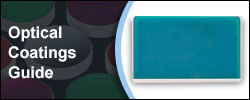
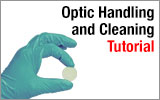
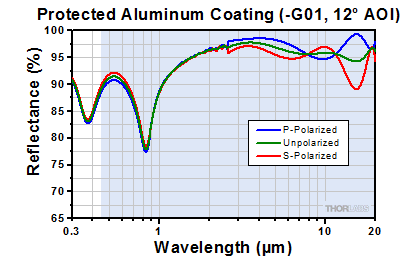
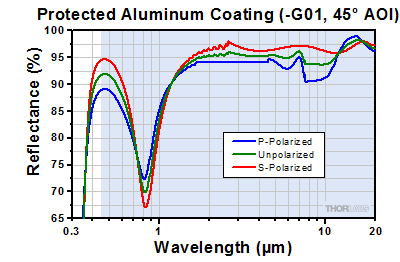
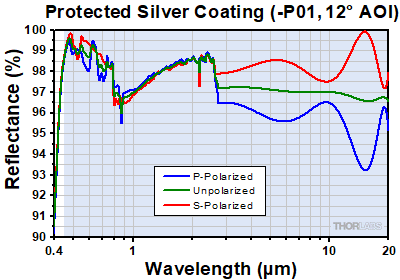
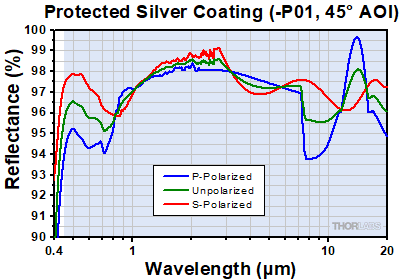
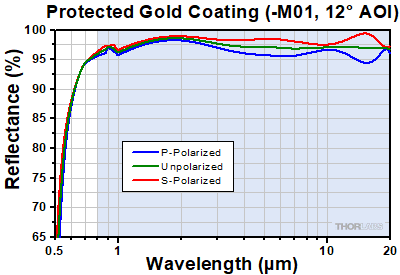
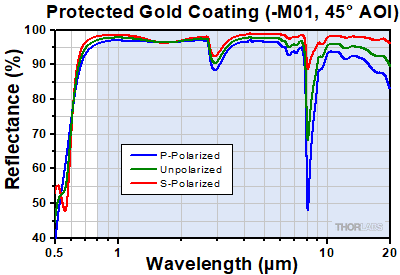
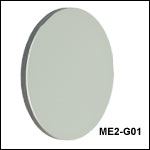
 Zoom
Zoom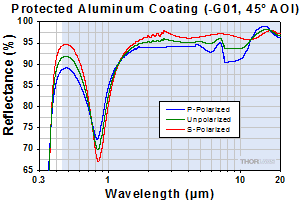
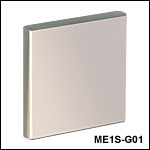
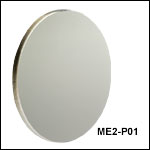
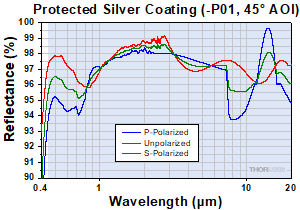
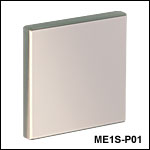
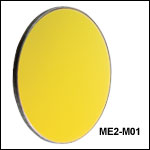
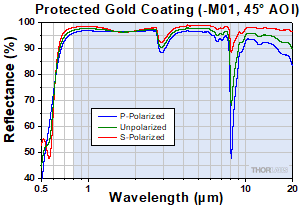
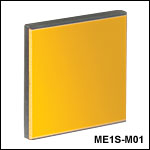
 Economy Metal-Coated Plano Mirrors
Economy Metal-Coated Plano Mirrors